Have you ever used your birthday or phone number as your PIN for your bank card or ATM? While it might seem convenient, this could be a risky habit! A recent study revealed that many people use simple and predictable PINs, making them vulnerable to cyberattacks.
Table of contents [Show]
What is a PIN?
| PIN stands for Personal Identification Number. |
| It's a secret code you use to access your bank accounts, debit cards, or mobile wallets. |
| A strong PIN is crucial for protecting your hard-earned money. |
Why are Weak PINs Dangerous?
| Imagine someone stealing your ATM card. If your PIN is easy to guess, like "1234" or "0000," they could easily access your money. | |
| Similarly, hackers might try common PIN combinations to break into your online accounts if your PIN is weak. | |
| According to a cybersecurity report, these are some of the most commonly used – and easily guessed – PINs: | 1234 |
| 0000 | |
| 1111 | |
| 7777 | |
| 2222 | |
Creating a Strong PIN:
Here are some tips to create a strong PIN that's difficult to crack:
| Avoid Numbers in Sequence: | Don't use consecutive numbers like "1234" or "5678." |
| Skip Birthdays and Phone Numbers: | These are easily guessable based on personal information. |
| Mix Numbers: | Use a combination of high and low numbers, like "3851" or "7029." |
| Don't Use Repeating Digits: | Avoid PINs like "2222" or "9999." |
Remember, your PIN is like your key to your financial accounts. Don't share it with anyone, and consider changing it regularly for added security.
Beyond the PIN: Additional Security Measures
While a strong PIN is essential, it's not the only line of defense. Here are some additional tips to protect your money:
| Enable Two-Factor Authentication: | Two-factor authentication, which needs an extra verification step in addition to your PIN, is something that many institutions offer. |
| This adds an extra layer of security. | |
| Beware of Phishing Scams: | Don't click on suspicious links or give out your PIN information over the phone or email. |
| In no case will your bank use these channels to request your PIN. | |
| Monitor Your Accounts Regularly: | Keep an eye on your bank statements and online accounts for any suspicious activity. |
You may greatly lower your chance of becoming a victim of cyberattacks and safeguard your hard-earned money by adhering to these simple tips.
Keeping Your Money Safe: A Shared Responsibility
| When it comes to protecting your finances, financial institutions are crucial. |
| Many banks offer security features like transaction alerts and the ability to temporarily block your card if it's lost or stolen. |
| If you have any concerns about suspicious behaviour or doubt the strength of your PIN, don't hesitate to get in touch with your bank. |
The Bottom Line:
| Protecting your money starts with being aware of potential risks and taking proactive measures. |
| By creating a strong PIN, following additional security practices, and staying vigilant against scams, you can ensure your financial information remains secure. |
| Keep in mind that spending a few minutes on security now might save you a great deal of hassle later! |








